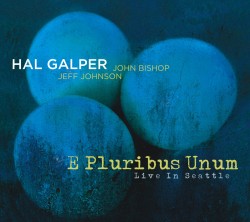MUSIC REVIEW BY Bret Saunders, The Denver Post
I hadn't thought of Hal Galper in a long time.
There were a couple of records showcasing his flawless piano technique that I had discovered at my college radio station in the '80s. I remembered that he was touring with saxophonist Phil Woods for a while. But for whatever reasons, I hadn't heard his music, other than an occasional cut on the radio, for a couple of decades.
It turns out that Galper, a Bostonian and respected educator, never went away. And judging by his most recent music, it's an easy call to say that Galper is one of a handful of the most intriguing pianists working anywhere right now.
Last year's "Art-Work" on the Origin label, with bassist Reggie Workman and the late drummer Rashied Ali, is complex, ecstatic and sometimes astonishing when you realize that Galper is in his 70s. He performs as an artist completely absorbed in the world of sound, and had I heard it in 2009 it would have easily made my top 10.
Galper will bring his trio (with bassist Jeff Johnson and drummer John Bishop) to Colorado for a couple of rare local shows, at the University of Colorado at Boulder on April 2 and Dazzle on April 3. I recently interrupted him in a fit of composition ("I've stumbled on a way of writing for this trio based on a Brazilian harmonies," he said) to ask him a few questions.
Q: Because you have worked with some remarkable saxophonists, like Woods and Cannonball Adderley, why have you opted for the trio format in the past several years?
A: I enjoy a quartet, but with a trio, I can be more orchestral. The piano is an orchestra. And I'm a hog: I don't get to play enough when I'm working with another musician.
Q: You wrote an academic piece on stage fright in 1989. Did this stem from your experiences as a performer?
A: There were some vestiges of it in myself, but not anymore. I run into it as a teacher. The problem with stage fright is (the performer is) taking things too seriously. You can't ever lose sight of that, and you have to keep a risk-taking attitude.
Q: You are on the faculty of the New School of Jazz and Contemporary Music in New York, and you're a distinguished alumnus of the Berklee College of Music. Is there anything you have discovered that cannot be taught to students of jazz in the university setting?
A: "You can't teach the rhythm. You can't teach the groove. It can only be learned from people who are better than you."
Galper knows of what he speaks. Students and jazz aficionados in general should take something from him when he appears here. Don't miss out as I have for so many years.
There were a couple of records showcasing his flawless piano technique that I had discovered at my college radio station in the '80s. I remembered that he was touring with saxophonist Phil Woods for a while. But for whatever reasons, I hadn't heard his music, other than an occasional cut on the radio, for a couple of decades.
It turns out that Galper, a Bostonian and respected educator, never went away. And judging by his most recent music, it's an easy call to say that Galper is one of a handful of the most intriguing pianists working anywhere right now.
Last year's "Art-Work" on the Origin label, with bassist Reggie Workman and the late drummer Rashied Ali, is complex, ecstatic and sometimes astonishing when you realize that Galper is in his 70s. He performs as an artist completely absorbed in the world of sound, and had I heard it in 2009 it would have easily made my top 10.
Galper will bring his trio (with bassist Jeff Johnson and drummer John Bishop) to Colorado for a couple of rare local shows, at the University of Colorado at Boulder on April 2 and Dazzle on April 3. I recently interrupted him in a fit of composition ("I've stumbled on a way of writing for this trio based on a Brazilian harmonies," he said) to ask him a few questions.
Q: Because you have worked with some remarkable saxophonists, like Woods and Cannonball Adderley, why have you opted for the trio format in the past several years?
A: I enjoy a quartet, but with a trio, I can be more orchestral. The piano is an orchestra. And I'm a hog: I don't get to play enough when I'm working with another musician.
Q: You wrote an academic piece on stage fright in 1989. Did this stem from your experiences as a performer?
A: There were some vestiges of it in myself, but not anymore. I run into it as a teacher. The problem with stage fright is (the performer is) taking things too seriously. You can't ever lose sight of that, and you have to keep a risk-taking attitude.
Q: You are on the faculty of the New School of Jazz and Contemporary Music in New York, and you're a distinguished alumnus of the Berklee College of Music. Is there anything you have discovered that cannot be taught to students of jazz in the university setting?
A: "You can't teach the rhythm. You can't teach the groove. It can only be learned from people who are better than you."
Galper knows of what he speaks. Students and jazz aficionados in general should take something from him when he appears here. Don't miss out as I have for so many years.
Soundclips
Other Reviews of
"E Pluribus Unum - Live in Seattle":
Jazzmozaïek - Belgium by Marc Van de Walle
All Music Guide by Ken Dryden
New York City Jazz Record by Ken Dryden
Audiophile Audition by Ethan Krow
JazzChicago.net by Brad Walseth
Jazziz, Summer 2010 by Bob Weinberg
JazzTimes by Bill Milkowski
Rifftides by Doug Ramsey
All About Jazz by Dan McClenaghan
